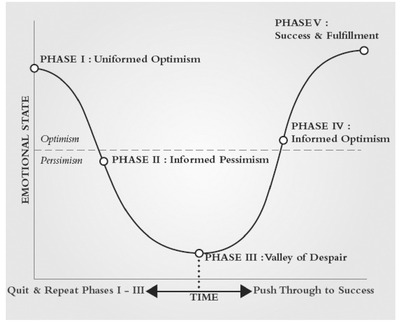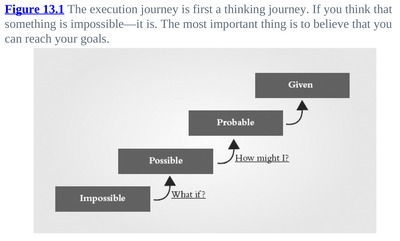Home · Book Reports · 2025 · The 12 Week Year

- Author :: Brian P. Moran and Michael Lennington
- Publication Year :: 2013
- Source :: 12_Week_Year_(2013).pdf
designates my notes. / designates important. / designates very important.
Thoughts
- That which gets measured gets accomplished.
Exceptional Quotes
- To be truly effective, your daily activity must align with your long-term vision, strategies, and tactics.
- Measurement drives the execution process.
- you have greater control over your actions than over your results.
- The only things you control are your thinking and your actions.
- In our efforts to not miss anything, we unwittingly miss everything.
- As George Patton once said, “A good plan today is better than a perfect plan tomorrow.”
- If you want different results, then you need to be willing to do things differently and do different things.
Table of Contents
- 01: The Challenge
- 02: Redefining the Year
- 03: The Emotional Connection
- 04: Throw Out the Annual Plan
- 05: One Week at a Time
- 06: Confronting the Truth
- 07: Intentionality
- 08: Accountability as Ownership
- 09: Interest versus Commitment
- 10: Greatness in the Moment
- 11: Intentional Imbalance
- 12: The Execution System
- 13: Establish Your Vision
- 14: Develop Your 12 Week Plan
- 15: Installing Process Control
- 16: Keeping Score
- 17: Take Back Control of Your Day
- 18: Taking Ownership
- 19: 12 Week Commitments
- 20: Your First 12 Weeks
- 21: Final Thoughts and the 13th Week
Part I - Things You Think You Know
Part II - Putting It All Together
· 01 - The Challenge
page 11:
- “If we did the things we are capable of doing, we would literally astound ourselves.” - Thomas Edison
page 12:
- Execution is the single greatest market differentiator.
Part I - Things You Think You Know
· 02 - Redefining the Year
page 17:
- Annualized thinking and planning more often than not leads to less than optimal performance. In order to perform at your best you will need to get out of the annual mode and scrub your annualized thinking. Stop thinking in terms of a year; instead focus on shorter time frames.
page 19:
- “We are what we repeatedly do. Excellence then is not an act, but a habit.” -Aristotle
page 22:
- And just like you do at the end of a calendar year, every 12 weeks you take a break, celebrate, and reload. It might be a three-day weekend or a weeklong vacation; the important thing is that you take time out to reflect, regroup, and reenergize.
· 03 - The Emotional Connection
page 23:
-
In our experience, the number-one thing that you will have to sacrifice to be great, to achieve what you are capable of, and to execute your plans, is your comfort.
-
Think about what you truly want to achieve. What legacy do you want to create? What do you want for yourself and for your family? What do you want spiritually? What level of security do you seek? What level of income and fulfillment do you want from your career? What interests do you wish you could pursue? What do you really want to do with the time you have been allotted?
page 24:
- The first step is to create a personal vision, a vision that clearly captures and articulates what you want in life. The personal vision should define the life you want to live in all areas, including spiritual, relationships, family, income, lifestyle, health, and community. The personal vision creates the foundation for an emotional link to your business and career objectives so that there is a strong alignment between what you pursue in your business and the life you desire to live.
· 04 - Throw Out the Annual Plan
page 29:
- There will always be more opportunities than you can effectively pursue. With the 12 Week Year, the approach is to be great at a few things instead of mediocre at many things. In 12 week planning, you identify the top one to three things that will have the greatest impact, and pursue those with intensity.
· 05 - One Week at a Time
page 32:
- To be truly effective, your daily activity must align with your long-term vision, strategies, and tactics.
page 33:
-
To use your weekly plan effectively, you will need to spend the first 15 or 20 minutes at the beginning of each week to review your progress from the past week and plan the upcoming one. In addition, the first five minutes of each day should be spent reviewing your weekly plan to plan that day’s activities.
-
A 12 Week Year creates greater focus by highlighting the value of each week. With the 12 Week Year, a year is now equivalent to 12 weeks, a month is now a week, and a week is now a day. When you look at it this way, the importance and power of each day becomes even greater.
· 06 - Confronting the Truth
page 36:
-
Measurement drives the execution process.
-
That which gets measured gets accomplished.
-
you have greater control over your actions than over your results.
page 39:
- the process is not about being perfect, but rather about getting better and better.
· 07 - Intentionality
page 41:
-
Benjamin Franklin said, “If we take care of the minutes, the years will take care of themselves.”
-
There are three primary components of performance time: strategic blocks, buffer blocks, and breakout blocks.
-
Strategic Blocks: A strategic block is a three-hour block of uninterrupted time that is scheduled into each week. During this block you accept no phone calls, no faxes, no emails, no visitors, no anything. Instead, you focus all of your energy on preplanned tasks—your strategic and money-making activities.
page 42:
-
Buffer Blocks: Buffer blocks are designed to deal with all of the unplanned and low-value activities—like most email and voicemail—that arise throughout a typical day. Almost nothing is more unproductive and frustrating than dealing with constant interruptions, yet we’ve all had days when unplanned items dominated our time.
-
Breakout Blocks: One of the key factors contributing to performance plateaus is the absence of free time. Very often entrepreneurs and professionals get caught up in working longer and harder, but this approach kills your energy and enthusiasm. To achieve greater results, what’s often necessary is not actually working more hours, but rather taking some time away from work. It’s not by chance that people often quote the famous proverb “All work and no play makes Jack a dull boy.” When we don’t take time off from work, we can lose our creative edge. Should be 3 hours.
· 08 - Accountability as Ownership
page 44:
-
In the book Freedom and Accountability at Work: Applying Philosophic Insight to the Real World, the authors Peter Koestenbaum and Peter Block discuss accountability as follows:
-
We have a small way of thinking about accountability. We think that people want to escape from being accountable. We believe that accountability is something that must be imposed. We have to hold people accountable, and we devise reward and punishment schemes to do this. These beliefs are so dominant in our culture that they are difficult to question, yet they are the very beliefs that keep us from experiencing what we long for.
page 45:
- The only things you control are your thinking and your actions.
· 09 - Interest versus Commitment
page 48:
- When you’re interested in doing something, you do it only when circumstances permit, but when you’re committed to something, you accept no excuses, only results.
· 10 - Greatness in the Moment
page 51:
- In our efforts to not miss anything, we unwittingly miss everything.
· 11 - Intentional Imbalance
Part II - Putting It All Together
· 12 - The Execution System
page 59:
- The 12 Week Year builds on a foundation of three principles that in the end
determine an individual’s effectiveness and success. These principles are:
- Accountability
- Commitment
- Greatness in the Moment
page 60:
- These five disciplines are:
- Vision
- Planning
- Process Control
- Measurement
- Time Use
page 61:
-
To apply the 12 Week Year will require change, and change is uncomfortable.
-
Psychologists Don Kelley and Daryl Connor describe this phenomenon in a paper called “The Emotional Cycle of Change.” Kelley and Connor’s emotional cycle of change (ECOC) includes five stages of emotional experience
page 62:

- There are five stages that people move through emotionally when changing their behavior: I. Uninformed Optimism II. Informed Pessimism III. Valley of Despair IV. Informed Optimism V. Success and Fulfillment
· 13 - Establish Your Vision
page 69:

· 14 - Develop Your 12 Week Plan
page 77:
-
fiercely consistent focus on the few vital actions that drive your results
-
Annual plans are typically not action-based … most annual plans are objective-based
-
Typical annual plans tell you what has to be achieved but they don’t specify how.
page 83:
- As George Patton once said, “A good plan today is better than a perfect plan tomorrow.”
· 15 - Installing Process Control
· 16 - Keeping Score
page 100:
- the most effective lead indicator you can have is a measure of your weekly execution. It is critical that you measure execution. (more than results, but measure them as well)
· 17 - Take Back Control of Your Day
page 109:
- To accomplish what you desire will take sacrifice. The number-one thing you will need to sacrifice is your comfort.
· 18 - Taking Ownership
page 118:
- We have all heard stories of people who refuse to take responsibility for their actions and blame others for their failures. It’s their parents’ fault, their boss’s fault, the fault of the conservatives or liberals, the cigarette companies, the fast- food industry—the system is out to get them. Whah, whah, whah! Someone or something else is always the cause of their failure. Our culture supports this victim mentality more and more. In fact, our legal system even promotes it. We now reward people for not taking responsibility for their choices and finding someone or something other than themselves to blame.
page 121:
- If you want different results, then you need to be willing to do things differently and do different things.
· 19 - 12 Week Commitments
· 20 - Your First 12 Weeks
· 21 - Final Thoughts and the 13th Week
page 151:
- At the end of every 12 Week Year, there is a 13th week. The 13th week exists as an opportunity for you to review your results from the previous 12 weeks, and to launch you into the next 12 Week Year with fresh goals and a plan to reach them.